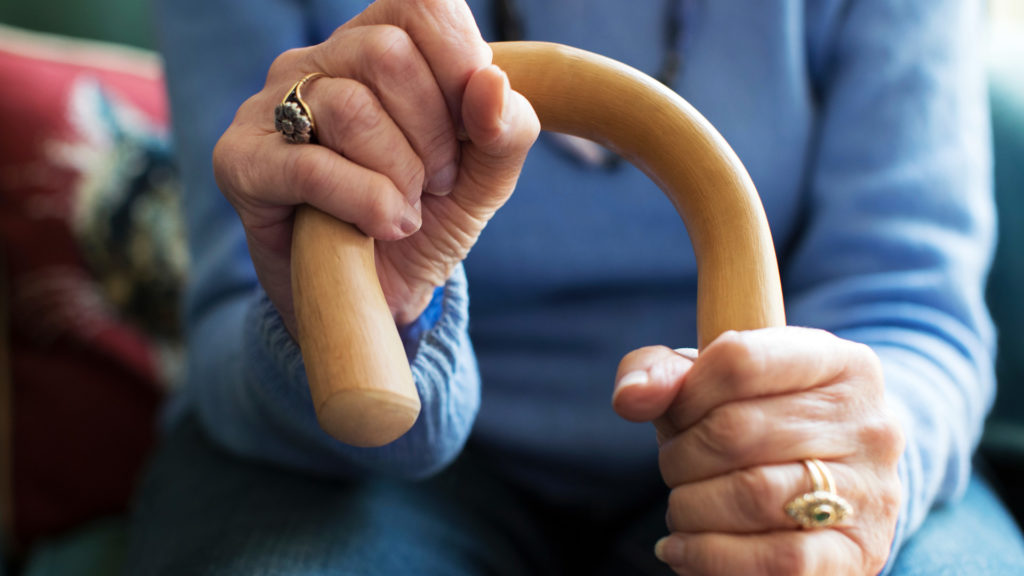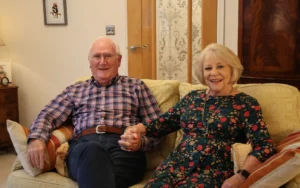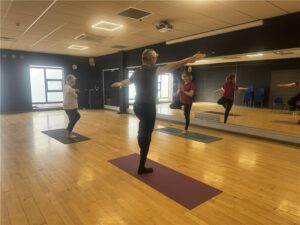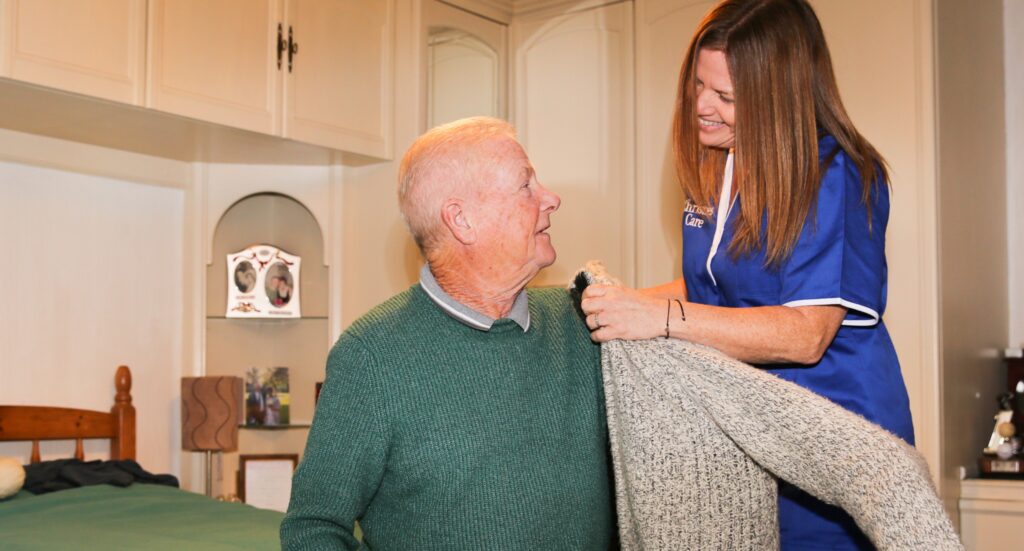
Life after a stroke can be a challenging journey for both the stroke survivor, and their loved ones. It can be difficult to come to terms with the realities of life post-stroke, and the process of finding the necessary care and support can be overwhelming.
This ‘Life After A Stroke’ guide is designed to help you through that process. It covers crucial aspects of stroke awareness, including:
- Symptoms to watch out for
- Life after stroke and how to adapt
- The importance of homecare post-stroke
- Aphasia
- Suffolk and UK Stroke Resources and Support Services
We hope that our ‘Life After A Stroke’ guide offers valuable information and comfort to those seeking to support their loved ones after a stroke.
‘BE FAST’: How to Recognise the Symptoms of a Stroke.
Being able to recognise the symptoms of a stroke is vital for timely medical intervention. A quick response can significantly affect the outcome for the stroke survivor. The acronym, ‘BE FAST’ can help you to identify the signs of a stroke:
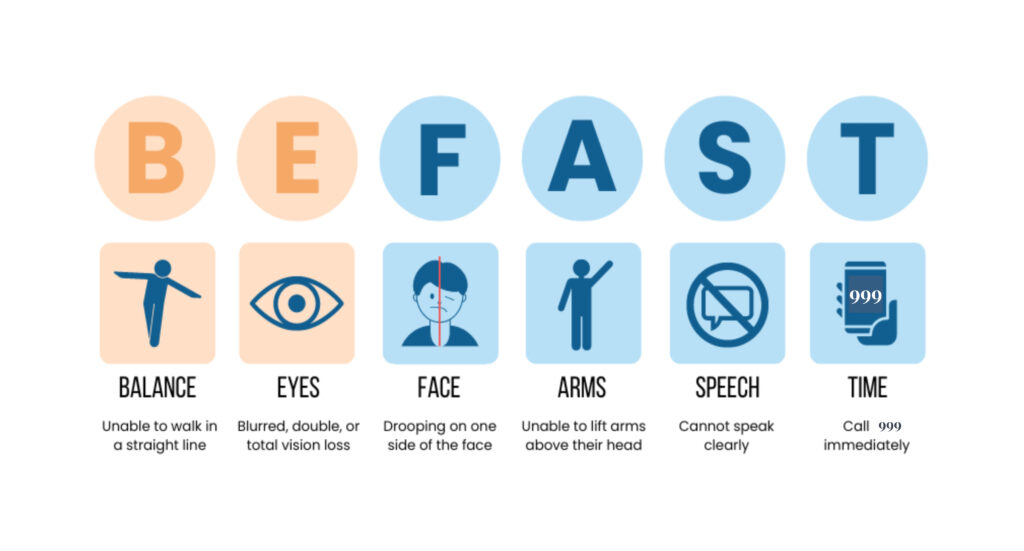
Balance – sudden problems with balance or coordination
Eyes – vision problems in one or both eyes, including blurring, double vision, or a total loss of vision
Face – drooping on one side of the person’s face (test this by asking them to smile)
Arms – weakness in one arm (if they hold out both arms, does one arm drift down?)
Speech – difficulty speaking or understanding speech
Time to get help – if you notice any of these symptoms, call for medical help and get the person to a hospital immediately.
Other symptoms of a stroke include confusion, dizziness, numbness of limbs or face (especially on one side of the body) and a sudden, severe headache.
Recognising these symptoms early and responding quickly, can minimise the long-term effects of the stroke and can even save the person’s life.
Life After a Stroke: Changes You May Notice and How to Adapt
The aftermath of a stroke is different for every stroke survivor and depends on the area of the brain affected, as well as the severity of the stroke.
- Many stroke survivors experience physical challenges such as partial paralysis or muscle weakness, which can affect mobility and the ability to perform daily tasks. This may also be compounded by fatigue, a frequent occurrence after strokes.
- There may be cognitive issues such as memory loss or difficulty concentrating or solving problems.
- Emotional changes are common too – some stroke survivors experience mood swings, anxiety, and/or depression.
- Some stroke survivors may also show behavioural changes. These changes may include increased irritability, impulsiveness, or a shift in personality traits depending on the ways in which the stroke has affected the brain.
After Stroke Care Tips and Support: The benefits of After Stoke Homecare
Each stroke survivor will have unique needs when it comes to their care. Homecare is tailored entirely to the needs of the individual so that all their unique needs will be met.
There are many benefits of After Stroke Homecare:
- The stroke survivor is able to stay in a familiar, comforting place and does not have to go through the stress of moving
- Regular routines can be maintained with the help of a live-in or hourly carer
- Care at home is personalised and provides one-on-one support and
- Helps to encourage the stroke survivor to rebuild independence and confidence. It is important to understand that improvement is gradual, and that each small step forward is still progress to be celebrated.
After a stroke, a personalised care plan should be developed in collaboration with healthcare professionals. This care plan might include physical therapy to improve mobility, speech therapy for those dealing with aphasia, and occupational therapy to rebuild the skills needed for daily tasks.
It may also be necessary to make safety modifications in the home, such as installing grab bars in bathrooms and removing tripping hazards to reduce the risk of falls.
Part of the care plan might also be to establish a routine to make it easier to manage medications, appointments, and daily activities.
Helping your Loved One to Rebuild Lost Skills
The process of rebuilding lost skills is often facilitated by medical professionals but continues in the home with the support of family members and caregivers. It is a gradual process, beginning with simple tasks and slowly increasing in complexity as their abilities improve. Repetition is critical as it helps to strengthen the neural pathways in the brain that have been damaged.
Caregivers can support this relearning process by creating a supportive environment that encourages practice, celebrates small victories, and maintains a positive outlook.
It is essential to be patient with the individual and to tailor activities to their current ability.
Supporting a Loved One with Aphasia
Aphasia is a language disorder caused by damage to the parts of the brain dealing with language. This is a fairly common occurrence after a stroke.
Aphasia can impact one’s ability to speak, understand speech, read, or write, which can be incredibly frustrating and distressing for a stroke survivor. Supporting a loved one with aphasia requires compassion and the use of strategies that facilitate communication.
These strategies include:
- Simplifying language by using short, straightforward sentences
- Using visual aids like pictures and gestures to convey meaning.
- Encouraging the use of all forms of communication (not just speech) is important for the stroke survivor’s self-esteem and sense of independence.
- Speech therapy is often a vital part of after-stroke recovery and can significantly improve language skills over time. Family members and caregivers can support the work done in speech therapy by participating in exercises and encouraging consistent practice at home.
Remember: effective communication goes beyond spoken words – it is about connection and understanding. If you want to learn more about non-verbal communication, watch our video here:
Christies Care Case Studies: Life After A Stroke
Adapting to Meet New Needs
When my family faced the reality of life after a stroke, it felt overwhelming at first. The diagnosis and the sudden need for care left us reeling, but we found strength in each other and the incredible support from healthcare professionals and Christies Care After-Stroke Care Services.
We decided to focus on setting small, achievable goals, and we celebrated every milestone, no matter how minor it seemed. We adapted to our new circumstances, making changes to our home to accommodate new mobility challenges and learning new ways to communicate as we navigated aphasia.
Through patience, resilience, adaptability, and outstanding care delivered at home, we not only improved our loved one’s quality of life after a stroke but also grew stronger as a family.
Finding Strength in Support
When my spouse had a stroke, my world changed in an instant. I suddenly found myself transitioning from being a life partner to a full-time caregiver—a role filled with new responsibilities and challenges I hadn’t anticipated.
To cope, I leaned on support networks. I sought out community resources, joined support groups, and utilised Christies Care Respite Care Services, which gave me a chance to take much-needed breaks.
These resources were a lifeline, offering not only practical help but also emotional support. They reminded me that I wasn’t alone in this journey and helped me feel less isolated.
I’ve learned that asking for help isn’t a sign of weakness—it’s a vital part of maintaining physical, mental, and emotional well-being, both for myself and for my ability to provide the best care for my spouse.
My journey navigating life after a stroke has taught me that the strength of a caregiver is magnified by the support they receive, and I hope my story encourages others to embrace the help available to them.
To read more about our After-Stroke Services to help you Navigate Life After A Stroke, click here
What After-Stroke Support Is There For Stroke Survivors in Suffolk and Essex?
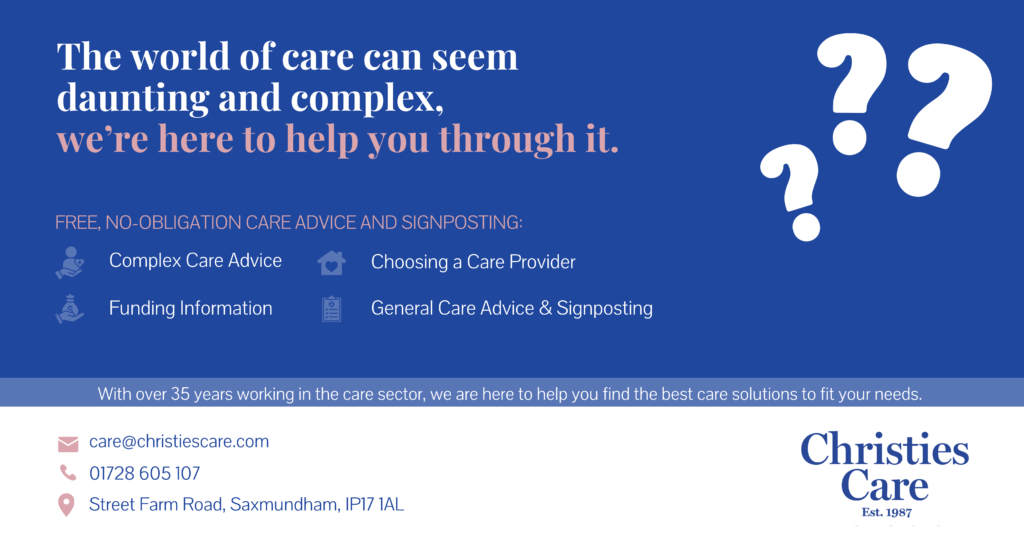
Suffolk Home Modifications:
Suffolk Mobility Solutions
suffolkmobilitysolutions.co.uk
01449 257071
www.facebook.com/SuffolkMobilitySolutions/ – from ramps, wet rooms, levelling floors, and widening doors to grab rails that all fit the aesthetic of your home. Available throughout Suffolk, including Bury St. Edmunds, Ipswich, Stowmarket, and Woodbridge.
For more information and finding other Suffolk based stroke support services, visit:
www.stroke.org.uk/finding-support/support-services/suffolk-communication-support
Financial Help:
www.stroke.org.uk/stroke/life-after/financial-support
UK-Wide Stroke Services:
If you have any questions or need any advice related to care and after stroke support, give us a call on 01728 605 107. Our Care and Training Team will be more than happy to speak with you.
If we cannot help you, we will be able to direct you to the most suitable resources or organisations.
